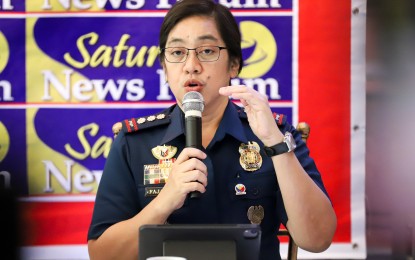
PNP information chief and spokesperson Col. Jean Fajardo (PNA photo by Robert Oswald P. Alfiler)
MANILA – The Philippine National Police (PNP) has deferred the implementation of the policy regulating tattoos among its officers and applicants.
PNP spokesperson Col. Jean Fajardo said chief Gen. Rommel Francsico Marbil ordered the Directorate for Personnel and Records Management (DPRM) to review Memorandum Circular 2024-023 that orders uniformed and non-uniformed personnel to have their visible tattoos removed.
“Nagsalita rin 'yung ating Chief PNP si Gen. Marbil at sinabi niya sa ating mga concerned directorate, particularly 'yung DPRM, na muling pag-aaralan itong circular na ito dahil na-ipasa ito during the time ng (Our Chief PNP, Gen. Marbil, has spoken and he told our concerned directorates particularly the DPRM that this circular will be re-examined because it was passed during the time of) former PNP chief Benjamin Acorda Jr.,” Fajardo said at the Saturday News Forum in Quezon City on April 27.
Fajardo said Marbil wants the policy reviewed before its full implementation, particularly the provision that officers and staff need to remove all visible tattoos while in uniform because it involves health and financial issues.
Fajardo previously said cops with existing tattoos are required to execute an affidavit, declaring their markings that are not visible.
The policy excludes aesthetic tattoos, such as but not limited to eyebrows, eyeliner or lips, Fajardo said.
The PNP said unauthorized tattoos include extremist, ethnically, or religiously discriminatory and offensive, indecent tattoos, racist, sexist, and tattoos associated with prohibited or unauthorized groups.
Fajardo said cops who refuse to follow the policy would face administrative charges.
Earlier, Manila 3rd District Rep. Joel Chua slammed the order as unconstitutional, saying tattoos are artistic expressions and protected by the right to free expression.
Fajardo countered that like any other constitutional freedom, "it is not absolute.” (Lloyd Caliwan/PNA)
